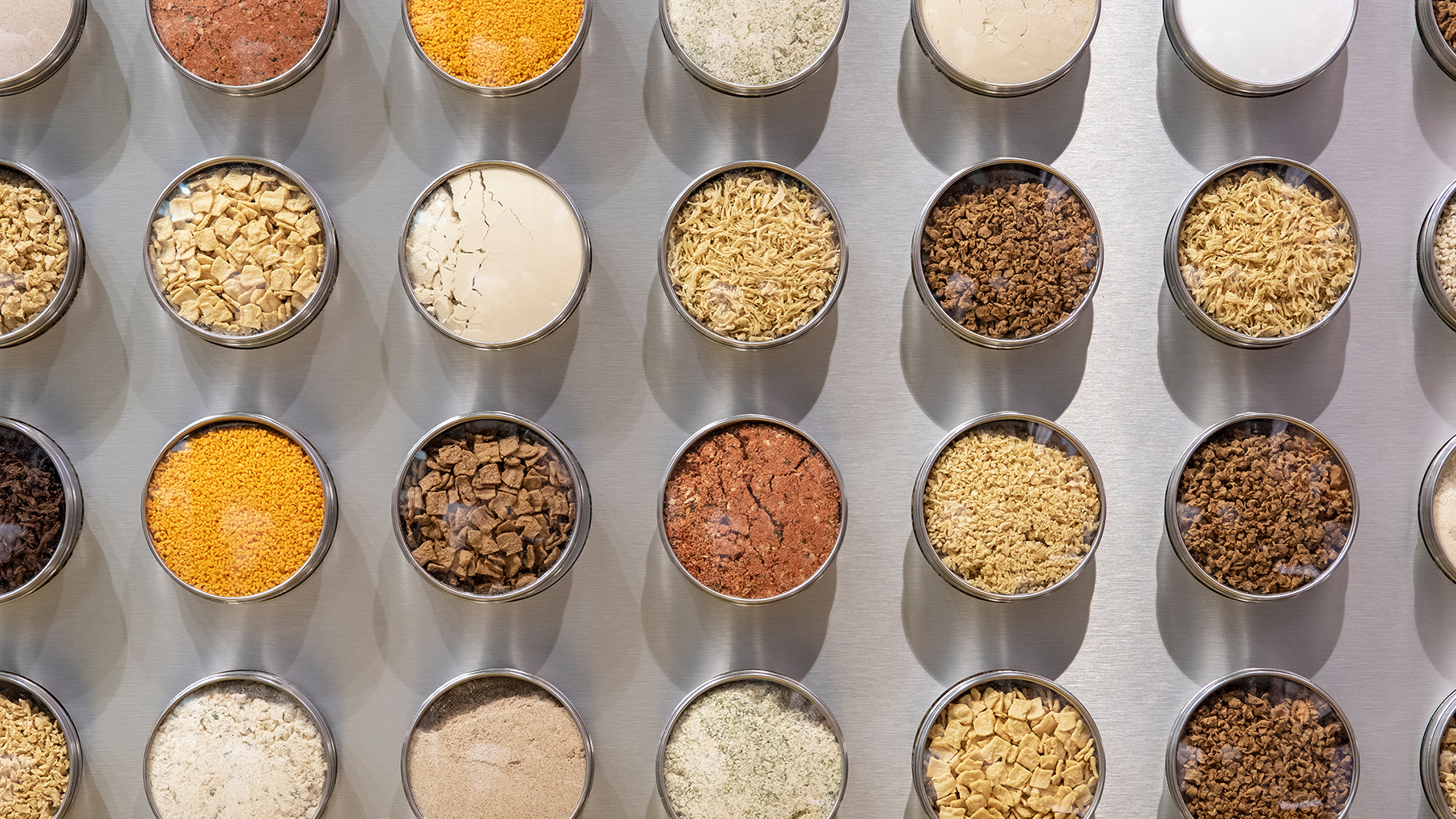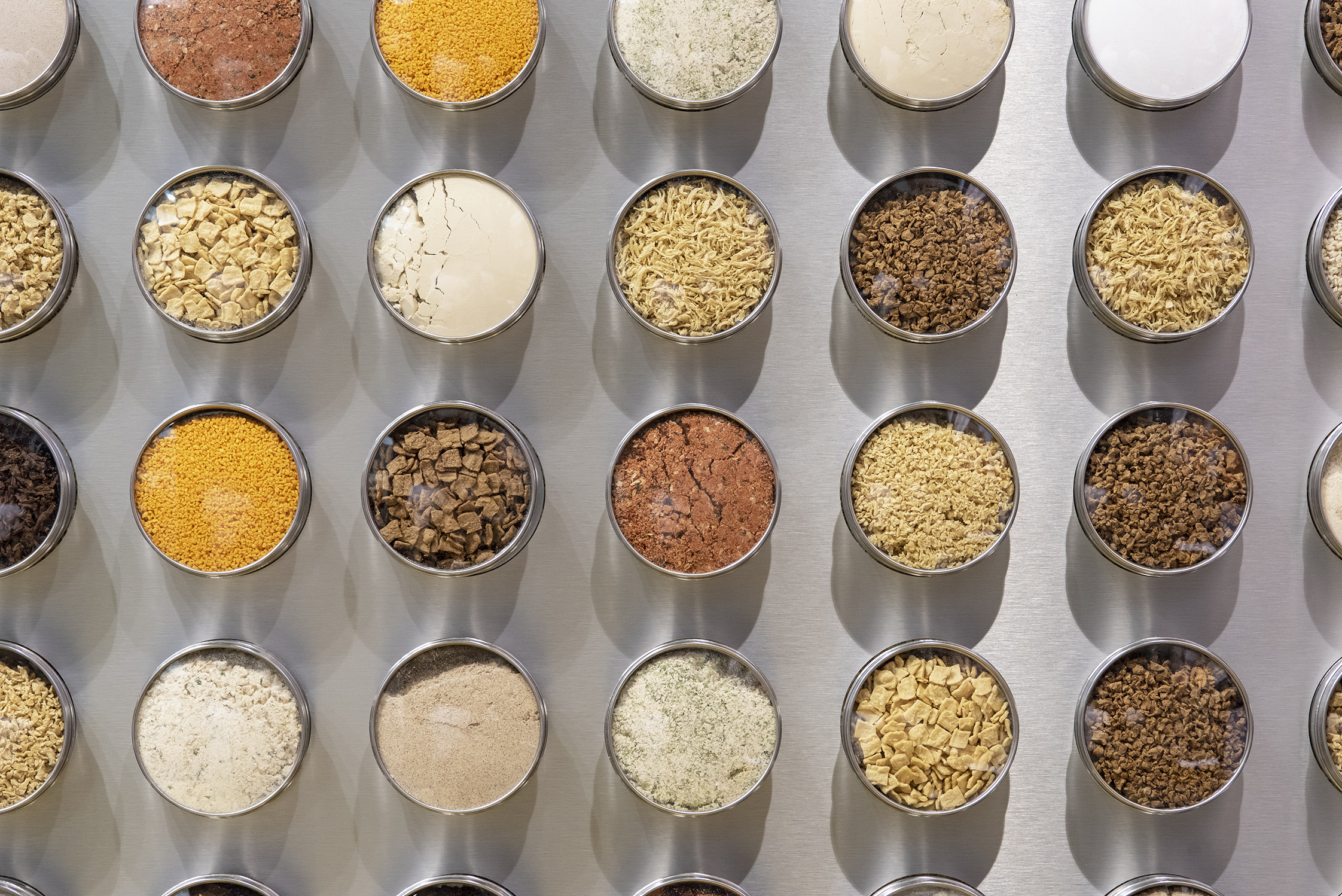The market for plant-based meat alternatives is experiencing high growth rates. In a recently published study, the Good Food Institute estimates that plant-based meat sales will comprise roughly 6% of the global meat market in 2030[1]. In addition to soy or rice, other raw materials such as lupines, peas, wheat, sunflowers, hemp or even algae are used in the manufacture of these products. Research into new protein sources is also in full swing. For consumers, the added health value as well as the similarity to meat in terms of mouthfeel, taste and appearance play an important role. According to an analysis by the Boston Consulting Group[2], plant-based proteins could catch up with their animal counterparts in terms of price, taste and texture by around 2023.
A number of manufacturers who offer the raw material - protein flours or protein texturates - for further processing into meat alternatives present themselves at IFFA. Among the ingredients and casings manufacturers for plant-based products are ADM, Biospringer, Euroduna Food Ingredients, Givaudan, Hydrosol/Planteneers, Loryma, Soy Austria or Viscofan. "A delicious taste is the main criterion for consumers when purchasing plant-based products. It is important to take a holistic approach when developing new products; ingredients, technology, market trends, and culinary influences are all important factors to consider”, knows Lucas Huber, Marketing Manager Plant Attitude Europe, Taste & Wellbeing at Givaudan. "Our expertise in taste, texture, colours, proteins, and ingredients enables us to co-create outstanding products with our customers as well as accelerate NPD." For Norbert Klein, Head of Research and Development at Loryma, texture is the key word to make plant-based alternatives catch on. "For perfect end products, we offer a wide variety of innovative extrudates, binding and stabilising systems as well as panades and coatings. Special attention is paid to a short ingredient list and attractive nutritional values - functional ingredients made from wheat can score here and offer technological advantages at the same time." In order to reduce time and costs in product innovations, digital configurators, which allow manufacturers to put together their desired product within a very short time, play an important role. "Digitalisation is advancing in leaps and bounds in the B2B sector as well," explains Dr. Dorotea Pein, Head of Product Management at Planteneers. "In this respect, it seemed only logical to us to offer a tool that makes digital product development enormously easier for our customers."

Processing technologies - amazingly similar to meat
Extrusion processes are often used to obtain a meat-like texture. Depending on the process, dry granulates can be produced that are further processed into minced-meat-like products or, through wet extrusion, fibrous protein structures for vegetarian escalopes, for example. Important suppliers at IFFA 2022 include Bühler and Coperion. The importance of extrusion for the production of meat alternatives is summarised by Stefan Gebhardt, General Manager Sales and Strategy, Business Unit Food & Pharma at Coperion: "With extrusion technology, all users, e.g. start-ups as well as larger manufacturers of meat alternatives, are provided with the appropriate core technology to meet the increasing market demand and to drive further product developments in this area. The flexibility of the twin-screw extruder enables the production of TVP (dry texturisation) and HMMA (wet texturisation) as well as numerous other extrudates on one machine. In addition, our technologies also enable the use of new protein alternatives such as hemp protein and microalgae."
Further processing into patties, cutlets or sausages is carried out using classic food processing machines such as cutters, mincers, fillers or forming machines, which are also used in meat processing. Numerous technology suppliers at IFFA will therefore offer not only their production lines for meat processing but also those for the production of meat alternatives and will be available to trade fair visitors to answer any questions they may have on the subject of processing alternative proteins. These include, for example, Albert Handtmann Maschinenfabrik, Gea Food Solutions, Marel, Marlen International, Maschinenfabrik Seydelmann, Metalquimia, Middleby, Provisur and Vemag Maschinenbau. "With plant-based products, it is first and foremost about offering consumers alternative options. To make the decision as easy as possible, shape and appearance play a crucial role in being able to classify the alternatives. In addition to classic applications such as burger patties, minced meat or sausages, we offer room for creative ideas, new shapes and individual solutions," knows Jens Thörnich, Product Manager Plant Based Protein at Vemag Maschinenbau. "From semi-automatic filling to highly automated processes, we present a wide range for the production of various applications with alternative protein sources."
Cultured meat and insect proteins are in the starting blocks
Cultured meat is launching entirely new players. Start-ups in biotechnology from all over the world are working on the meat of the future from the laboratory. The principle is the same everywhere: Stem cells are taken from an animal via biopsy, both from muscle and fat tissue, in order to reproduce meat. The cells are then multiplied in large bioreactors and the cell masses can then be formed into patties, for example. The use of 3D printers or edible carriers creates clean meat products with texture. To increase acceptance and lower the price, companies are researching plant-based nutrient solutions to replace the animal serum that was previously necessary. What still needs to be done before cultured meat will be more widely available is summarised by Stephanie Jaczniakowska-McGirr, International Head of Food Industry & Retail at ProVeg International: “Although cultured meat shows promising possibilities, we identify three pressing challenges: More publicly-funded, open-source research is required to address some technical challenges. Further development of the regulatory framework is needed to create a supportive environment for producers and consumers. More widespread information is required in order to pave the way for the fair and objective reception of cultured meat in society.”
Insect-based foods also have the potential to make a significant contribution to the protein supply of the future. At IFFA, the Fraunhofer Institute for Process Engineering and Packaging is placing a special focus on automated insect breeding and processing within the entire value chain for alternative proteins at the stand of the VDMA Food Processing and Packaging Machinery Association. Max Hesse, group leader for machine and process development at the Fraunhofer IVV, explains: "Insect breeding and processing in Asia still largely takes place using manual labour. In order to be competitive, the industry, which is currently characterised by SMEs and start-ups in Europe and Germany, must achieve a high degree of automation. We at the Fraunhofer IVV are therefore researching, among other things, topics related to automated, industrial cultivation in order to make insect proteins available on a large scale. As living organisms with different sizes/shapes and vitality parameters, insects pose great challenges for automation. With the help of sensor technology and AI-based analysis software, we want to sort insects with certain characteristics (e.g. fat/chitin content), for example, and unlock them for targeted use in secondary or profit-generating material streams." Further processing of the insect protein is then carried out via extrusion processes and processing machines, as with plant-based proteins.
IFFA 2022 will be the hub for discussions on alternative proteins. An attractive supporting programme with numerous lectures will provide further information. At least 200 of the total of around 900 exhibitors at IFFA offer products for the production of meat alternatives. Visitors can search for these companies in the IFFA Contactor, the exhibitor and product search for the fair, via the Special Interest "Plant-Based & Alternative Proteins".
With six trade fairs on four continents, Messe Frankfurt is accompanying the dynamic growth of the global food industry. Further information on the events in the "Food Technologies" portfolio can be found at: www.food-technologies.messefrankfurt.com
[1] https://gfi.org/resource/anticipating-plant-based-meat-production-requirements-2030/
[2] https://www.bcg.com/de-de/publications/2021/the-benefits-of-plant-based-meats
Online Press Accreditation
The online press accreditation for IFFA 2022 is now available:
https://pressaccreditation.messefrankfurt.com
Due to a system change, please note the following information:
- The previous login data for the Messe Frankfurt accreditation tool (before 2021) is no longer valid.
- If you already have a Messe Frankfurt login, please use this access data to register.
- We would like to ask you to update or complete your profile at this time.
- If you are registering online for the first time and do not yet have an account, simply go through the registration process step by step.
In case of any further question, please contact press.iffa@messefrankfurt.com
IFFA
Technology for Meat and Alternative Proteins
The event will be held from 14 to 19 May 2022.
Press information and photographic material:
http://IFFA.messefrankfurt.com/press
Follow IFFA on social media:
www.iffa.com/follow-iffa
Background information on Messe Frankfurt
The Messe Frankfurt Group is the world’s largest trade fair, congress and event organiser with its own exhibition grounds. The Group employs approximately 2,300* people at its headquarters in Frankfurt am Main and in 30 subsidiaries around the world. In 2021, the company had to contend with the challenges posed by the pandemic for the second consecutive year. Annual sales will be approximately €140* million after having been as high as €736 million in 2019 before the pandemic. Even in difficult times caused by the coronavirus pandemic, we are globally networked with our industry sectors. We have close ties with our industry sectors and serve our customers’ business interests efficiently within the framework of our Fairs & Events, Locations and Services business fields. One of the Group’s key USPs is its closely knit global sales network, which extends throughout the world. Our comprehensive range of services – both onsite and online – ensures that customers worldwide enjoy consistently high quality and flexibility when planning, organising and running their events. We are expanding our digital expertise with new business models. The wide range of services includes renting exhibition grounds, trade fair construction and marketing, personnel and food services. Headquartered in Frankfurt am Main, the company is owned by the City of Frankfurt (60 percent) and the State of Hesse (40 percent).
For more information, please visit our website at: www.messefrankfurt.com
* Preliminary figures for 2021
